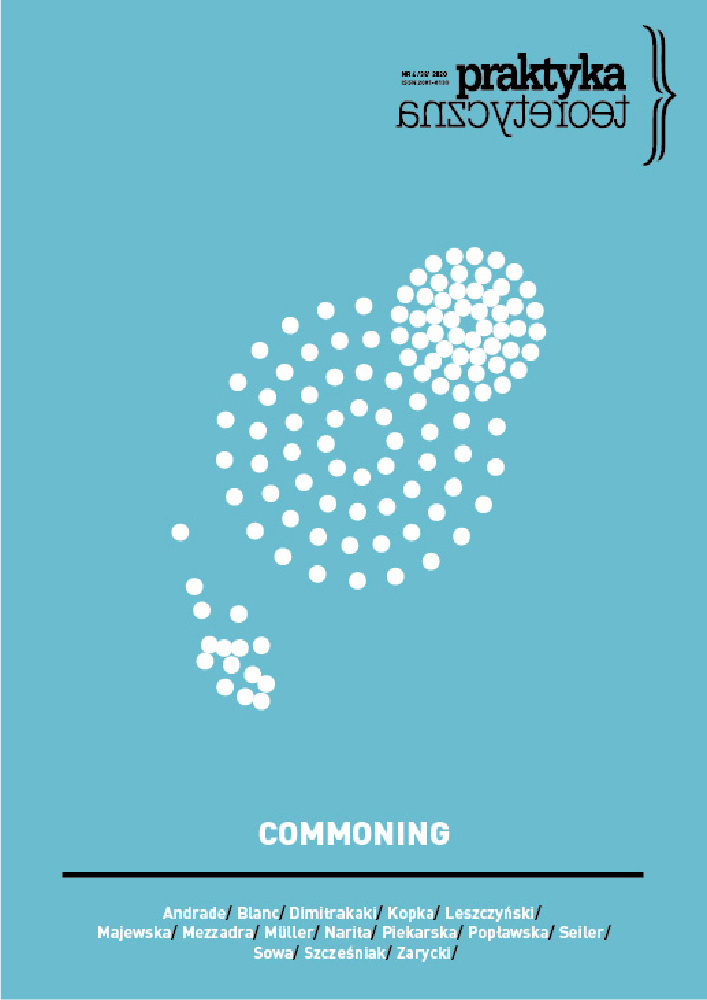Abstract
The article engages in a discussion with Martin Müller’s article In Search of a Global East through the categories of class and class distinction. While recognizing the potential political value of the “Global East” project, the author questions the ideological mechanisms which naturalize the stereotype of “Eastness as forsakenness.” As she points out, one of the effects of the “political and epistemological pro-ject” of the North–South divide (as well as stereotypical categorizations of the East) is obscuring the internal class dynamics of Northern, Southern and Eastern societies. In contrast, introducing class analysis – which includes exami-ning such practices as producing and buying counterfeits of original, luxury-brand commodities – allows us to uncover similar patterns of class distinction and reproduction across global capitalist societies of the North, South and East, and perhaps also to forge solidarities amongst classes which are regularly oppressed by the dominant global capitalist order.
References
Brandtstädter, Susanne. 2009. “Fakes: Fraud, Value-Anxiety, and the Politics of Sincerity.” In Ethnographies of Moral Reasoning: Living Paradoxes of a Global Age, ed. Karen Sykes. New York: Palgrave Macmillan.
Crăciun, Magdalena. 2014. Material Culture and Authenticity: Fake Branded Fashion in Europe. London: Bloomsbury Publishing.
Eyal, Gil, Iván Szelényi and Eleanor R. Townsley. 2000. Making Capitalism without Capitalists. London: Verso.
Hann, Chris M., Catherine Humphrey, and Katherine Verdery. 2002. “Introduction. Postsocialism as a Topic of Anthropological Investigation.” In Postsocialism: Ideas, Ideologies and Practices in Eurasia, ed. Chris M. Hann, Catherine Humphrey, and Katherine Verdery. London–New York: Routledge.
Kennedy, Michael D. 2002. Cultural Formations of Post-Communism: Emancipation, Transition, Nation and War. Minneapolis: University of Minnesota Press.
Kiossev, Alexander. 2008. “The Oxymoron of Normality”. Eurozine, January 4. http://www.eurozine.com/articles/2008-01-04-kiossev-en.html.
Hugrée, Cédric, Etienne Pénissat, and Alexis Spire. 2019. Social Class in Europe: New Inequalities in the Old World. London: Verso.
Nakassis, Constantine V. 2012. “Counterfeiting What? Aesthetics of Brandedness and BRAND in Tamil Nadu, India.” Anthropological Quarterly 85(3): 701–721.
Pine, Francis. 2002. “From Production to Consumption in Post-socialism?” In Markets and Moralities: Ethnographies of Postsocialism, ed. Ruth Mandel and Caroline Humphrey. Oxford: Berg.
Pinheiro-Machado, Rosana. 2010. “The Attribution of Authenticity to ‘Real’ and ‘Fake’ Branded Commodities in Brazil and China”. In Cultures of Commodity Branding, ed. Andrew Bevan, David Wengrow. Walnut Creek: Left Coast Press.
Szcześniak, Magda. 2015. “Weak Images of the Middle Class”. View: Theories and Practices of Visual Culture 11. https://www.pismowidok.org/en/archive/2015/11-capitalist-realism.-transformations-of-polish-visual-culture/weak-images-of-the-middle-class.
Szcześniak, Magda. 2016. Normy widzialności: Tożsamość w czasach transformacji. Warszawa: Fundacja Bęc Zmiana–Instytut Kultury Polskiej UW.
Vann, Elizabeth F. 2006. “The Limits of Authenticity in Vietnamese Consumer Markets”. American Anthropologist 108(2): 286–296.
Verdery, Katherine. 1996. What Was Socialism, and What Comes Next. Princeton: Princeton University Press.
License
“Theoretical Practice” seeks to put into practice the idea of open access to knowledge and broadening the domain of the commons. It serves the development of science, thinking and critical reflection. The journal is published in open-access mode under the CC-BY-NC-SA 4.0 license (detail available here: http://creativecommons.org/licenses/by-nc-sa/4.0/). Articles published in the journal may be freely distributed, stored, printed and utilized for academic and teaching purposes without restrictions.
They should not be, however, used for any commercial purposes or be reconstructed into derivative creations. Access to the journal may not be limited or offered for a fee by any third party.
Prospective authors are obliged to fill in, sign and send back the publishing contract compliant with the CC licencing. [PL.pdf, PL.doc, EN.pdf,EN.doc].
According to this contract, authors grant the journal a non-exclusive right to publish their work under the creative commons license (CC-BY-NC-SA 4.0) without any financial obligation on both sides of the contract.
Before submission authors should make sure that derivative materials they use are not protected by copyright preventing their non-commercial publication. Authors are responsible for any respective copyright violations.
